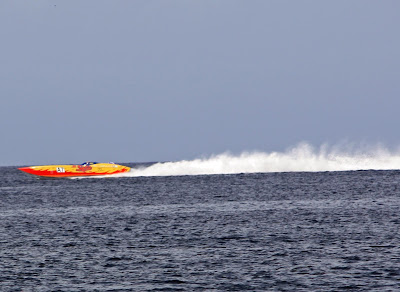We really have enjoyed our 4 week stay in Tobago. We particularly enjoyed the blue water,
friendly people and just relaxing. We
spent the entire month on the North shore going as far as Store Bay. We did get
about 700 liters of diesel before moving from Charlottesville, but they had to
drive to another town to find fuel. We
could have gotten more but darkness fell and we decided not to stay yet another
day.
We moved to Castara Bay where we spent considerable time. They had a nice town with a few restaurants
and an enormous mud oven. We happened to
arrive on one of the two days during the week when the village ladies do their
baking. We ordered a couple of loaves
and some coconut tarts and cookies and had to return at the end of the day to
collect them. Man were they good, fresh
and warm from their oven.
From our boat we could watch the locals come together and set
and haul in huge nets to catch bait fish.
They would store the live fish in cooperative, floating bins and all the
fishermen would take what they needed.
At every village we could buy fresh fish from the local
fishermen and did so several times. We
liked Bucco Bay the most since it was very calm and they had a convenient dock
for getting on and off the dingy and keeping our feet dry. Each day we would watch the horses riding and
swimming on the beach. Kim and Emily
spent many days snorkeling or digging grand canals on the white sand
beaches. Emily’s only complaint was that
she could not find hermit crabs to inhabit her creations.
Trinidad and Tobago offer some of the best bird-watching in
the Caribbean, boasting over 430 recorded species of bird (250 of which
actually breed on the islands). Although Trinidad is renowned as a birdwatchers
paradise, Tobago is home to around 220 species of bird, including some not
regularly seen in Trinidad. Keen birders will be interested to learn that there
are also a number of sub-species of bird in Tobago that do not occur elsewhere,
including the Tobago variants of the Red-legged
Honeycreeper and Blue-grey
Tanager.
We rented a car for two days and did some bird watching and
took in some of the attractions. We
headed in the early morning to the Adventure Park where we saw many birds and hummingbirds
and walked a short trail.
We saw the Black throated mango Humingbird.
The Rufous-breasted Hermit hummingbird seen here is noticeable
by being quite large and having an elegantly curved beak.
The copper rumped hummingbird is one of my favorites with its
beautiful green and bronze plumage and little white trousers
Mot-mots, with their striking plumage of green upperparts,
black crowns ringed with bright blue, russet under-parts and blue
racquet-tipped tails, usually inhabit the forest undergrowth.
The male (black spotted) and female (brown) Barred Antshrike
(Thamnophilus doliatus)


The Rufous-tailed Jacamar (Galbula ruficauda)
We headed over to the capital of Scarborough and toured Fort
King George. The remains of Fort King George remain one of Tobago's best
preserved monuments. Our free guide explained that the walls were all original
from the British ship ballast stones and mortared using egg and natural binders
and were in remarkably good condition. The approaches to the fort take you past
the current hospital and the prison. The fort itself was built in the 1770's
and the cannons remain as they were, overlooking the coast.
The short fat cannon came from a ship and fired a big load of
rocks and broken glass. The prisoner's bell tank, barracks and officer's mess
can still be seen. The Tobago Museum is housed in the Barrack Guard House and
has artifacts from Tobago's early history, plus Amerindian artifacts, military
relics and documents from the colonial period.
All around the island, trees were wrapped with red, white and
black flags and banners proclaiming the 51 years of independence of Trinidad. Their Independence Day is August 31st and we
were happy to be here and celebrate with them.
Also during our stay they held the Great Race, an
annual powerboat speed race from Trinidad to Tobago. We were anchored in Store
Bay near a turning bouy and watched the winners chased by helicopters while
sipping our morning coffee.
After a mouthwatering lunch at Rena’s Rotis in Scarborough, we
headed up the south coast to Argyle Falls.
These falls are Tobago's highest waterfalls, tumbling 175ft in a series
of stepped cascades. We enjoyed the 15 minute walk (after refusing a paid
guide) and had a delightful fresh-water swim beneath the falls.
From there we headed across the Rain Forest Reserve to Bloody
Bay climbing the rugged mountains with winding switchbacks and shear drop-offs. We then drove southwest along the North coast
enjoying a different perspective on the coast we had sailed by earlier. I must admit it seemed a little more
enjoyable in an air conditioned car!
We again stopped by the Adventure Park to see some more birds
take their afternoon snack and headed into Store Bay to enjoy a pizza before
heading back aboard Emily Grace.
We are readying our sturdy ship to make the 60 mile hop to
Trinidad. It is not far but is a
significant milestone for us. This short
passage will close the loop of our global circumnavigation as we were in
Trinidad in 2009.
We will do some repairs there to get ready to make the final passages
through the Caribbean and back to America.
Emily will start her 8th grade studies while Kim and I focus on
contractors and cleaning up our home.
Stay with us Dear reader as we are heading for the home stretch!
Tom



























